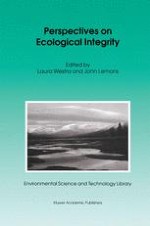1995 | OriginalPaper | Buchkapitel
Universal Environmental Sustainability and the Principle of Integrity
verfasst von : Robert Goodland, Herman Daly
Erschienen in: Perspectives on Ecological Integrity
Verlag: Springer Netherlands
Enthalten in: Professional Book Archive
Aktivieren Sie unsere intelligente Suche, um passende Fachinhalte oder Patente zu finden.
Wählen Sie Textabschnitte aus um mit Künstlicher Intelligenz passenden Patente zu finden. powered by
Markieren Sie Textabschnitte, um KI-gestützt weitere passende Inhalte zu finden. powered by
This paper seeks to focus the definition of environmental sustainability (ES), partly by distinguishing ES from social sustainability and from economic sustainability. The challenge to social scientists is to produce their own definition of social sustainability, rather than load social desiderata on to the definition of ES. Similarly with economic sustainability; let economists define it or use previous definitions of economic sustainability. The three types of sustainability—social, environmental and economic—are clearest when kept separate. They are contrasted in Table 1. While there is some overlap among the three in the goals of economic development (Figure 1), and certainly major linkages, the three are best disaggregated and addressed separately by different disciplines. Social scientists are best able to define social sustainability, and environmentalists do not have a major role in that task. The disciplines best able to analyze each type of sustainability are different; each follows different laws and methods. After disaggregating environmental sustainability we show that it is not ecosystem or nation specific, rather it is universal. Furthermore, we show that while all nations and eco-regions may need their own different approaches to ES, it is essentially non-negotiable.
